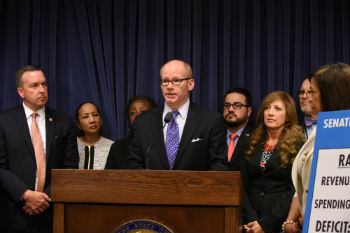 Today marks Day 6 in the 10-day special legislative session convened in an effort to reach agreement on a state budget.
Today marks Day 6 in the 10-day special legislative session convened in an effort to reach agreement on a state budget.
It may not appear that much has been happening on that front, but the four legislative leaders met Sunday – without Gov. Rauner – for the first time in months to talk about the budget. This is a significant development. The last time the leaders were in a room together to discuss the budget was Dec. 6.
As many of you know, in May the Senate passed a responsible, balanced budget and reform package – much of it based on priorities set by Gov. Rauner – and sent all of those bills to the House for consideration in an effort to bring stability to the state as soon as possible. The House did not to vote on any of the Senate’s bills before the May 31 deadline.
I have been engaged daily in discussions with other state lawmakers and with the Senate president about possible changes to our budget and reform bills that we could accept, and we are proposing ideas that could help to move the process along so that we can send a budget to the governor’s desk by Friday, the final day of the fiscal year.
I have every reason to believe the governor and my colleagues in the General Assembly understand the gravity of the situation we face and are ready to engage productively in good-faith budget negotiations.
Today also marks 726 days since Illinois last operated with a full-year budget. Here is what’s at stake if Gov. Rauner cannot come to an agreement with lawmakers on a budget by midnight Friday:
- Illinois likely will be downgraded to junk status by bond ratings agencies, which means state and local governments, including school districts, will pay higher interest rates when borrowing money. No state in the history of the country has ever been downgraded to junk status.
- As of August, Illinois no longer will have enough money coming in to cover expenses mandated by court orders. This, too, is a historic development for Illinois. Under the best of circumstances, the state will fall $185 million short of what it needs to make payments required by court orders and consent decrees in the absence of a budget. In addition to our looming failure to fully comply with court orders, the comptroller no longer will be able to triage payments to small businesses and human service providers desperate for a disbursement from the state to avoid layoffs or closure.
- Millions of dollars worth of road construction projects statewide could shut down July 1 without a budget, putting as many as 30,000 people out of work and draining money from local economies.
- Some public schools may not open on time this fall because the state is more than $1 billion behind on making categorical payments to school districts for transportation, lunch and special education programs.
- Accreditation for colleges and universities is in jeopardy, according to a warning from the Higher Learning Commission. Illinois universities have endured too much – declining enrollment, the loss of faculty and staff, increased tuition and fees, elimination of academic programs, the loss of MAP grants for students in need, cancelled capital improvement projects, depleted cash reserves and more.
- An estimated 100,000 children on Medicaid may not be immunized because doctors all over Illinois have put a hold on vaccinations until the state catches up on the money it owes them for thousands of vaccines they’ve already administered. This puts the state at risk for an outbreak of preventable diseases.
- Illinois’ bill backlog today stands at $14.96 billion, a figure that will continue to grow the longer the state operates without a budget. As of May, Illinois had paid more than $800 million in penalties for late payments.
- If the state doesn’t pass a budget this month, the Illinois Lottery will be suspended from the multi-state consortium that runs the Powerball and Mega Millions games, meaning customers won’t be able to purchase tickets in Illinois. While this pales in comparison to other consequences of our failure to pass a budget, it harshly illustrates the embarrassment this causes our state.
As you can see, the damage being done to Illinois is unnecessary, expensive and cruel. It will take generations to repair.
I urge you to contact the governor’s office this week and tell him to put a stop to this madness by finding common ground with lawmakers before Friday on a responsible, full-year budget that prioritizes financial stability for Illinois. The most hopeful starting point for negotiations is the balanced budget and reform package the Senate passed in May.
Learn more about the Senate’s budget and reform measures here.
As always, I encourage you to stay in touch. Should you have any questions this week, please contact my district office at 708-848-2002 or my Springfield office at 217-782-8176. You also can email my office, find me on Facebook and follow me on Twitter.



